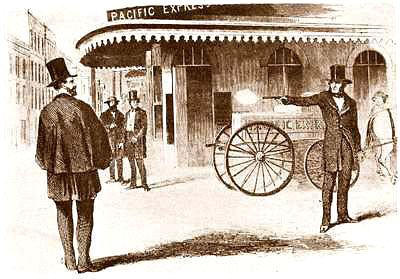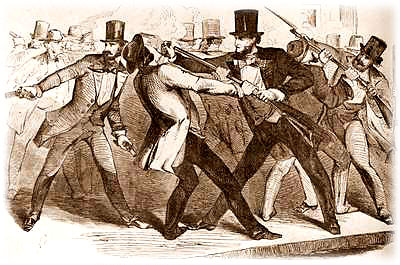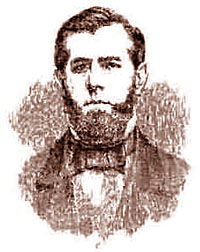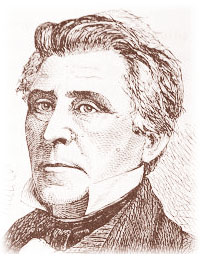
The Rivals
was Arthur Quinn's follow-up to his wonderful pop history of colonial America,
A New World. Like the earlier book, The Rivals is not
particularly deep, but while this wasn't a problem for A New World because it had so
much breadth, covering most of eastern North America and nearly two centuries, it's more of
a handicap for the later book. It sometimes feels like one of my old reports back in grade
school, when I'd try to vamp up a report by dressing up the three facts I knew with wordplay
and jokes and unusual presentations. Quinn does the same thing here; as in A New World,
his favorite trick is to describe people and things by relating contemporary jokes about them,
and the telling is thick with wordplay (eg, on Zachary Taylor: "Old Rough and Ready was old, all
right, and roughly ready to be put out to pasture.") This often feels like Quinn is trying to
disguise the fact that he's trying to turn a one-line newspaper account into a paragraph, or
a paragraph from an old biography into a chapter. The book sometimes feels a bit shallow and
it's often hard to keep all the names straight.
The two main figures in the book are the rivals of the title, William Gwin and David Broderick,
each of whom represented the new state of California in the US Senate in the 1850s. The 1850s
were, of course, the decade that led up to the Civil War. Even going to California schools, I
had never learned much about California's role in that tumult. I knew it had been admitted as
a free state under the Compromise of 1850, and that only stood to reason, because who on earth
thinks of California as part of the South? But it's not so clear cut. Everything south of
Monterey is below 36°30' and therefore should in theory have been open to slavery. And of
course California was settled by people who had flooded in from all over the world searching
for gold; a hell of a lot of them were Southerners. Gwin, who more or less wrote the state
Constitution, was an aristocrat from Mississippi. And for much of the period covered in
The Rivals, the most powerful political force in the state was the Chivalry, the
Southern wing of the Democratic Party. One of the lessons of the events of The Rivals,
though, is that you only have power to the extent that others agree that you do.
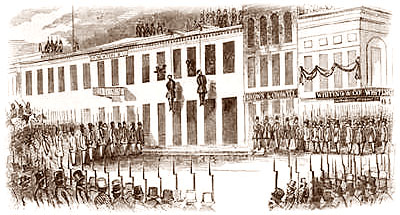 | |
Gwin's political hero was Andrew Jackson, who understood the illusory nature of power. When
John Marshall's Supreme Court ruled in favor of the Cherokee Nation in Worcester v. Georgia,
Jackson is purported to have said, "John Marshall has made his decision; now let him enforce it!"
Though this quote may be apocryphal, it does reflect the policy that the federal government and
the state of Georgia took toward the ruling: they just ignored it. Similarly, in the 1850s,
San Francisco was repeatedly taken over by vigilante mobs who ignored the civil government and
courts, hanging people they considered criminals and driving out immigrant groups (first the
Chileans, then the Australians — it was a bad decade to be from the Southern Hemisphere).
Since no one was able to fight them off, the vigilantes effectively controlled the city.
The more developed the society, the easier it is to forget that underneath it all lies the
application of violence. We divvy up resources in the legislature; we resolve disputes through
the courts. But in 1850s America, especially in Gold Rush California, people tossed aside these
institutions at a moment's notice and settled their differences with guns. Gwin, while in the
Senate, fought a duel with a member of the House of Representatives; Broderick, also while
in the Senate, fought a duel with the former Chief Justice of the California Supreme Court,
and was killed. Editorial writers were expected to carry guns and fight in the street
with those they had offended, and this was considered perfectly acceptable provided the offended
parties shouted "Defend yourself!" before opening fire. For both pundits and politicians, one's
fortunes in the public arena were largely predicated on being a good shot.
But while in The Big U Neal Stephenson has a character posit that "Law is the opinion
of the guy with the biggest gun," that's not strictly true. There is an upper limit to the
amount of violence one person can muster; you can't grab a rocket launcher and take over the
world. No matter how well armed you are, you can still be beaten if people gang up on you.
But that changes the equation. In The Big U, the follow-up to the postulate about
the law is that the "biggest gun" is the US Army. But an army is a fundamentally different
thing from a gun. An army is a fiction. An army is a way of behaving. It
only exists as an entity so long as the soldiers within it are acting in concert; otherwise
you're back to a bunch of guys each of whom is only capable of a limited amount of violence.
In 1851, for instance, the first Committee of Vigilance, ten thousand strong, was about to
hang a guy they mistook for Australian fugitive "English Jim" Stuart — poor guy was in
the wrong place with the wrong accent. David Broderick assembled a group to take on the mob.
His group had about fifty guys in it. But it wasn't 50 against 10,000; it was 50 against 1,
ten thousand times, because Broderick's men acted together and the mob didn't. Power isn't
quantity of armament; power isn't sheer numbers. Power is the ability to aggregate and
direct the will of groups of people. And I have no idea how that works.
Take David Broderick. Before getting himself elected to the Senate in a backroom deal —
this was back when state legislatures elected senators — Broderick operated the Northern
wing of the Democratic Party in California. He rigged elections, got people appointed to
various political posts, got legislation passed, and so forth. How? Why did people just do
what he said? I don't really know. Apparently some of it has to do with the fact that he knew
about twenty guys from back in New York who would do anything he told them to, and thus gained
a reputation as a guy you shouldn't mess with unless you wanted to risk a visit from Billy
Mulligan or Charlie Duane. So assemblymen just took their bribes and voted the way he said.
And once some people started to do Broderick's bidding, others followed suit, hoping to get on
the good side of the guy in charge. But how did Broderick become the leader of his little
gang of thugs in the first place? Quinn talks about how all agreed that Broderick had shown
he was a good guy to have at your back in a fistfight, but how does that translate into
lifelong voluntary servitude? And how did Broderick parlay knowing a dozen tough guys into
a Senate seat when surely there were other men with a similar coterie? I guess learning how
to do this is why people go to business school.
In 1856, California had two Senate seats open, one with a six-year term and one with a
four-year term. The Chivalry had lost some of its support to the nativist American Party, better
known as the Know-Nothings, which left Broderick in a position not only to orchestrate his own
election to the six-year term, but to choose who would accompany him. In the end, Gwin was willing
to abase himself most, publishing a letter formally ceding to Broderick federal patronage decisions
and explicitly stating that Broderick was responsible for his election. The popular view in
California was that Broderick was headed to Washington with Gwin as his little helper monkey.
But once they arrived, Broderick found that people in DC didn't do as he said the way they did
in Sacramento. When appointments for federal posts in California came up, Broderick had his
choices and Gwin had his, and curiously, Gwin's men always got the jobs. Why? Why did people
just do what Gwin said? I don't really know. Apparently some of it has to do with the fact
that he held swanky parties where President James Buchanan and various other senators and their
wives really enjoyed themselves. Broderick, as an Irish stonecutter's son and champion of the
working class, never had a prayer of joining the good ol' boy network, and ended up relegated
to serving as Stephen Douglas's sidekick before getting himself killed. Because power is
imaginary. All it took for Broderick to go from an absolute ruler to a nobody was for people
to stop doing what he said.
I remember that in my ninth grade history class, the teacher had us play a game that was supposed
to demonstrate how shifting alliances work. He divided the class into seven groups —
dubbed Britain, France, Germany, Belgium, Italy, Austria and Russia — and, every few
minutes, declared a "battle" between two of the countries. Then there was a negotiation
period, during which we all were supposed to walk around the room making deals. Whichever warring
country collected the most allies would win the battle and a certain number of points to divvy
up with its allies. The idea, I think, was that countries in a battle would try to win over
the wavering countries by promising them extra points to jump aboard.
That's not how it worked in practice. Three or four guys — the same ones who had
gotten themselves elected to ASB, the student government — decided among themselves during
the first negotiation period what the outcome would be, and told people whom to vote for. And
the others just shrugged and did as they were told. The ASB guys had decided that Germany would
win, followed by France, Britain, Belgium, Austria, Italy and Russia. The first battle was
France vs. Russia. Germany and Britain both signed up on the French side. Austria and Italy,
realizing that if they just went along with the ASB plan they'd come in 5th and 6th, joined up
with Russia. That left it up to Belgium. I was on team Belgium. I voted to give our vote to
the Russian side, because that way at least we weren't doomed to come in 4th. And no one else
on my team went along. They meekly gave their points to the French side. (As I recall, Josh
Lorton was particularly adamant about this. I guess he thought it would make the ASB guys
like him.) After that, there was no contest. Britain vs. Austria? 6-1, Britain. Germany
vs. Belgium? 6-1, Germany. (And we could have beaten them if we'd just formed a bloc with
the other three losers!) The teacher noticed that Germany and France were always on the same
side and declared Germany vs. France. Outcome: 6-1, Germany.
The ASB guys were able to just impose their will on a class of 40 students. No carrots, no
sticks, just "here's what will happen" and everyone else nodding. I have no idea how that
works. I do recall that because they were in student government, for fourth period they had
to take a class called Leadership. From what I could tell they just spent the class playing
volleyball out in the quad. But I guess they were learning something!

Return to the Calendar page!
|


